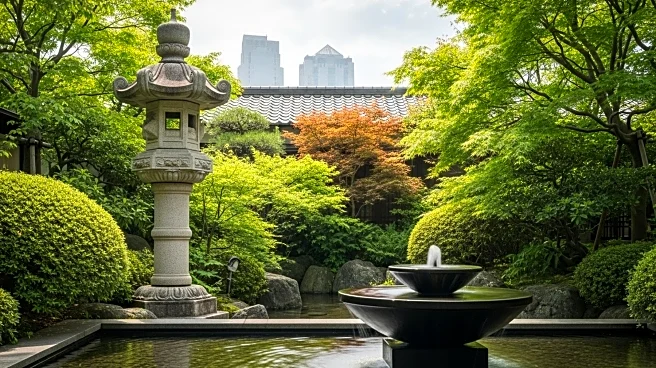What is the story about?
What's Happening?
The JW Marriott Hotel Tokyo has officially opened its doors on October 2, marking the brand's debut in Japan's capital city. Situated within the Takanawa Gateway City development, the hotel occupies the 23rd to 30th floors of the South Tower, offering guests panoramic views of Tokyo. The hotel features 200 rooms and is designed by the New York-based studio Yabu Pushelberg, incorporating elements of Zen philosophy and the natural beauty of Goten-yama. The property includes seven dining venues, developed in collaboration with Michelin-starred chefs Nishida Kazumine and Emmanuel Stroobant, offering a variety of cuisines from modern kappo to traditional Japanese dishes. Additionally, the hotel introduces the world's first JW Mindfulness Floor, which includes the Spa by JW, nine Mindful Rooms, a pool, and a fitness center, all aimed at promoting wellness and balance.
Why It's Important?
The opening of the JW Marriott Hotel Tokyo is significant as it represents the brand's expansion into one of the world's most dynamic and competitive hospitality markets. This move not only enhances Marriott's global presence but also caters to the increasing demand for luxury accommodations in Tokyo, especially with the city's growing status as a hub for culture, business, and innovation. The hotel's focus on mindfulness and wellness aligns with current global trends in hospitality, where travelers are increasingly seeking experiences that promote relaxation and well-being. This development could potentially set a new standard for luxury hotels in Tokyo, influencing future projects in the region.
What's Next?
As the JW Marriott Hotel Tokyo begins operations, it is likely to attract both international and domestic travelers seeking luxury and mindfulness experiences. The hotel's strategic location, just 20 minutes from Haneda Airport, positions it as a convenient option for business and leisure travelers alike. The success of this property could lead to further expansion of the JW Marriott brand in Japan and potentially inspire other luxury hotel brands to incorporate similar wellness-focused amenities. Additionally, the hotel's collaboration with renowned chefs and its diverse dining options may set a new culinary benchmark in Tokyo's hospitality scene.















